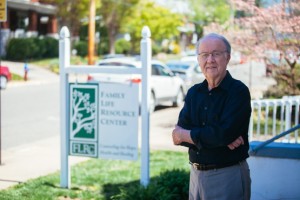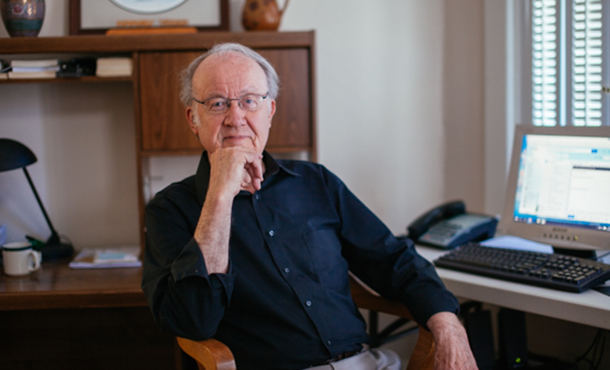Harvey Yoder ’64, SEM ’99, is guided by a steadfast vision of God’s future in which the “wolf lies down with the lamb, people study war no more, and prisoners are released.” In the half-century since his 1964 graduation, Yoder has quietly encouraged efforts to bring about God’s shalom.
While he prefaces mention of his accomplishments with “they didn’t set the world on fire,” his work—as a teacher, pastor, counselor, writer and community organizer in Harrisonburg, Virginia— has kindled flames of communication and cooperation. Yoder’s work garnered him other accolades. In March 2016, he received the Harriet Tubman Commemorative Leadership Award, awarded by the local Harriet Tubman Cultural Center.

“Harvey’s many years of leadership as Mennonite pastor and counselor in matters on faith, life, spirituality, relationships, values, peace, social and criminal justice reform has touched the lives of thousands,” the plaque reads.
In April, he was recognized as Counselor of the Year by the Central Valley Counselors Association.
Bridge-builder
For the first 20 years after his graduation, Yoder shared his time between teaching social studies and Bible at Eastern Mennonite High School and pastoring at Zion Mennonite Church. In addition to earning a master’s in congregational leadership at Eastern Mennonite Seminary, he earned a master’s in counseling psychology from James Madison University (JMU).
A year after Virginia Mennonite Conference founded the Family Life Resource Center in 1988, Yoder joined the Harrisonburg center as a full-time mental health counselor, while still serving as an unsalaried pastor of a house church congregation. His book, Lasting Marriage: The Owners’ Manual (Herald Press, 2007), distills some of his learnings, as does his radio program, “Centerpiece,” and his “Harvspot” blog at harvyoder.blogspot.com.
Yoder’s influence extends into the community. In 2014, when county supervisors proposed a new $63 million prison to alleviate overcrowding at the existing facility, Yoder joined others who were alarmed at the area’s soaring incarceration rates. He hosted a weekly meeting to address the issue and shepherded the group from merely opposing a new prison to broadly examining the root causes of mushrooming imprisonment.
In dealing with this emotionally charged topic, “Harvey has developed important and healthy relationships with others, even and especially with those who might not agree with him,” wrote Dr. Terry Beitzel, director of JMU’s Mahatma Gandhi Center for Global Nonviolence and a member of Yoder’s group. “He doesn’t get frustrated with others, but works with others through these frustrations to develop better conditions.”
Among other contributions, Yoder has also led a local chapter of Fellowship of Reconciliation, as well as guided Old Order Mennonites to create agricultural-forestal districts.
Working for shalom
Yoder grew up Amish, the eighth of nine children. He moved to the Shenandoah Valley from Kansas with his parents when he was 6. Nine years later, they left the horse-and-buggy group and joined the somewhat less conservative Beachy Amish.
Despite this move to “modernity,” Yoder’s parents were leery of Mennonite sway on their son, then 21, when he chose to attend Eastern Mennonite College. Harvey himself, however, found the influence formative and positive. “EMC expanded my world big time. My peers at EMC became my family.”
One literally did. “My parents were afraid I’d marry a Mennonite girl,” he says, “which I did,” he adds with a chuckle. Yoder married Alma Jean Wert ’63 of Juniata County, Pennsylvania. They have three adult children: Brent, Brad and Joanna Yoder ’98 Heatwole, and six grandchildren.
Yoder says he often questions the effectiveness of his influence in helping create God’s peaceable kingdom. “My grown daughter once gave me a candle of St. Jude, the saint of lost causes,” he says with a laugh. “But I can’t help dreaming of things as they truly should be, and as they in fact one day will be.”
